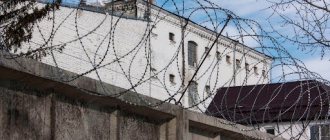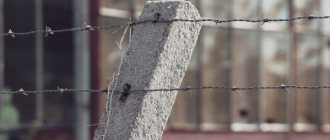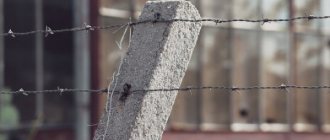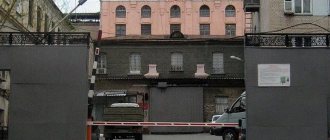Bill 73983-5, introducing a new system for counting time served in a pre-trial detention center when serving an actual sentence, has become a landmark in the humanization of criminal legislation.
It was under consideration in the State Duma of the Russian Federation for a little over ten years, and was considered in the final readings in just a few months. In this case, the activity of human rights activists and the public played a role (for example, a petition was formed on the website Change.org). Currently Art. 72 of the Criminal Code of the Russian Federation, as amended for 2022, with comments and explanations from experts, is available on all legal portals, as it was included in the Criminal Code of the Russian Federation in a new form, using the “day in one and a half” system. However, there are exceptions to this rule. We will consider the application of the above amendments in more detail later in the article.
Legal assistance:
Free in Russia: 8
Dear readers!
The free legal assistance hotline is available for you 24 hours a day!
Recent and planned changes
No amendments after Federal Law-186 of 07/03/2018, which became bill 73983-5, in Art. 72 of the Criminal Code of the Russian Federation has not been introduced, and legislators do not yet plan to return to this issue. Thus, there is no reason to think that a “day and a half” system will be introduced for a strict regime in 2022; the latest news on this topic does not indicate the development of relevant bills.
However, the results of the Federal Law No. 186 are already impressive: the Federal Penitentiary Service reported that, as a result of its implementation, over the period elapsed since its adoption, the terms of imprisonment were reduced for 96,000 prisoners.
Will there be a criminal amnesty in 2022 and under what articles?
Article 109 of the Code of Criminal Procedure of the Russian Federation. Terms of detention (current version)
1. Detention during the investigation of crimes cannot exceed 2 months.
2. If it is impossible to complete the preliminary investigation within up to 2 months and in the absence of grounds for changing or canceling the preventive measure, this period may be extended by a judge of a district court or military court of the appropriate level in the manner established by part three of Article 108 of this Code, for a period of up to 6 months. A further extension of the term can be carried out in relation to persons accused of committing grave and especially grave crimes only in cases of particular complexity of the criminal case and if there are grounds for choosing this preventive measure by a judge of the same court at the request of the investigator, submitted with the consent of the head of the relevant investigative body for a subject of the Russian Federation, another head of an investigative body equivalent to it, or at the request of an investigator in cases provided for in part five of Article 223 of this Code, with the consent of the prosecutor of a subject of the Russian Federation or a military prosecutor equivalent to him, up to 12 months.
3. The period of detention over 12 months can be extended only in exceptional cases in relation to persons accused of committing especially serious crimes, by a judge of the court specified in part three of Article 31 of this Code, or a military court of the appropriate level at the request of the investigator, submitted with consent in accordance with the jurisdiction of the Chairman of the Investigative Committee of the Russian Federation or the head of the investigative body of the relevant federal executive body (under the relevant federal executive body), up to 18 months.
4. Further extension of the period is not permitted. An accused person held in custody is subject to immediate release, except for the cases provided for in paragraph 1 of part eight and parts eight.1 - eight.3 of this article.
5. The materials of the criminal case completed by the investigation must be presented to the accused in custody and his defense attorney no later than 30 days before the end of the maximum period of detention established by parts two and three of this article.
6. If, after the completion of the preliminary investigation, the materials of the criminal case were presented to the accused and his defense attorney later than 30 days before the end of the maximum period of detention, then upon its expiration the accused is subject to immediate release. At the same time, the accused and his defense attorney retain the right to familiarize themselves with the materials of the criminal case.
7. If, after the end of the preliminary investigation, the deadlines for presenting the materials of this criminal case to the accused and his defense attorney, provided for in part five of this article, were met, but 30 days were not enough for them to familiarize themselves with the materials of the criminal case, the investigator, with the consent of the head of the investigative body in a constituent entity of the Russian Federation or the head of another investigative body equivalent to it has the right, no later than 7 days before the expiration of the deadline for detention in custody, to file a petition to extend this period before the court specified in part three of Article 31 of this Code, or a military court of the appropriate level. If several defendants in custody are involved in the criminal proceedings, and 30 days was not enough for at least one of them to familiarize themselves with the materials of the criminal case, then the investigator has the right to file the specified petition in relation to that accused or those accused who have familiarized themselves with the materials of the criminal case. case, if there is no longer a need to apply detention to him or them and there are no grounds for choosing another preventive measure.
8. A petition to extend the period of detention must be submitted to the court at the place of the preliminary investigation or the place of detention of the accused no later than 7 days before its expiration. The decision to initiate a petition sets out information about the investigative and other procedural actions carried out during the period after the selection of a preventive measure or the last extension of the period of detention of the accused in custody, as well as the grounds and motives for further extension of the period of detention of the accused in custody. The period specified in the decision to initiate a petition for which the detention of the accused is extended in custody should be determined based on the scope of investigative and other procedural actions given in this decision. If one of the reasons for extending the period of detention of the accused in custody is the need to carry out investigative and other procedural actions given in previous petitions, then the decision to initiate the petition shall indicate the reasons why these actions were not carried out within the previously established time limits for keeping the accused in custody. A copy of the resolution on the extension of the period of preliminary investigation or inquiry in a criminal case is attached to this resolution. The judge, no later than 5 days from the date of receipt of the petition, based on an assessment of the motives given in it, as well as taking into account the legal and factual complexity of the materials of the criminal case, the total duration of pre-trial proceedings in the criminal case, the effectiveness of the actions of officials of the preliminary investigation bodies and the timeliness of the investigation and other procedural actions takes, in the manner prescribed by parts four, six, eight and eleven of Article 108 of this Code, one of the following decisions:
1) on extending the period of detention for the period necessary to complete the acquaintance of the accused and his defense attorney with the materials of the criminal case, sending the criminal case to the prosecutor with an indictment, indictment, indictment or a resolution to send the criminal case to court for the application of compulsory medical measures nature, as well as for the prosecutor and the court to make decisions on the received criminal case, with the exception of the case provided for in part six of this article. The decision to extend the period of detention indicates the date until which the period of detention is extended. The court has the right to extend detention for a shorter period than specified in the decision to initiate a petition if it considers it sufficient to carry out the scope of investigative and other procedural actions specified in this decision. Extension of the period of detention in the case provided for in part seven of this article is allowed each time for no more than 3 months;
2) to refuse to satisfy the investigator’s request and to release the accused from custody. If a request to extend the period of detention in relation to the accused is refused, the judge, on his own initiative, has the right, if there are grounds provided for in Article 97 of this Code, and taking into account the circumstances specified in Article 99 of this Code, to choose a preventive measure in relation to the accused in the form of a ban certain actions, bail or house arrest.
8.1. In a criminal case sent to the prosecutor with an indictment, indictment, indictment or a resolution to send a criminal case to the court for the application of a compulsory measure of a medical nature, at the request of an investigator or investigator, initiated in the manner established by part three of Article 108 of this Code and part eight of this article, the period of prohibition of certain actions, the period of house arrest or the period of detention may be extended to ensure that the prosecutor, as well as the court, makes decisions on the received criminal case for a period, the duration of which is determined taking into account the terms provided for in part one of Article 221, or part first article 226, or part one of article 226.8, as well as part three of article 227 of this Code.
8.2. If the prosecutor returns the criminal case to the investigator in accordance with paragraph 2 of part one of Article 221 or paragraph 2 of part five of Article 439 of this Code and the investigator appeals this decision in accordance with part four of Article 221 of this Code, as well as the return of the criminal case to the investigator in accordance with paragraph 2 of part one of Article 226, paragraph 2 or 3 of part one of Article 226.8 of this Code and an appeal of this decision by the investigator in accordance with part four of Article 226 or part four of Article 226.8 of this Code at the request of the investigator or interrogator, initiated in the manner established by part three of Article 108 of this Code and part eight of this article, the period of prohibition of certain actions, the period of house arrest or the period of detention may be extended to ensure that a higher prosecutor, as well as the court, makes decisions on a received criminal case for a period, the duration of which is determined taking into account the terms provided for in part fourth article 221, or part four of article 226, or part four of article 226.8, as well as part three of article 227 of this Code.
8.3. In the case provided for in part two.1 of Article 221 of this Code, at the request of the prosecutor filed before the court during the pre-trial period no later than 7 days before the expiration of the period of prohibition of certain actions, the period of house arrest or the period of detention, the period of these preventive measures may be extended up to 30 days.
9. The period of detention during the pre-trial proceedings includes the period of detention during the preliminary investigation and the period of detention during the consideration of the criminal case by the prosecutor until he makes one of the decisions provided for in part one of Article 221, part one of Article 226, part first article 226.8 and part five of article 439 of this Code. The period of detention during the preliminary investigation is calculated from the moment the suspect or accused is taken into custody until the criminal case is sent to the prosecutor with an indictment, indictment, indictment or a resolution to send the criminal case to court for the application of a compulsory medical measure.
10. The period of detention also includes the following time:
1) for which the person was detained as a suspect;
1.1) the prohibition provided for in paragraph 1 of part six of Article 105.1 of this Code, at the rate of two days of its application per one day of detention;
2) house arrest;
3) forced stay in a medical organization providing medical care in an inpatient setting, or in a medical organization providing psychiatric care in an inpatient setting, by a court decision;
4) during which the person was detained in the territory of a foreign state upon a request for legal assistance or for his extradition to the Russian Federation in accordance with Article 460 of this Code.
11. Upon expiration of the maximum period of detention in the cases provided for in paragraphs 3 and 4 of part ten of this article, and if it is necessary to conduct a preliminary investigation or in the event of continuation of the trial, the court has the right to extend the period of detention of the person in the manner established by this article, but for no more than 6 months.
12. In the case of repeated detention of a suspect or accused in the same criminal case, as well as in a criminal case connected to it or separated from it, the period of detention is calculated taking into account the time spent by the suspect or accused in custody earlier.
13. Consideration by the court of a petition to extend the period of detention of the accused in custody in his absence is not allowed, except when the accused is undergoing an inpatient forensic psychiatric examination and other circumstances precluding the possibility of his being brought to court, which must be confirmed by relevant documents. In this case, the participation of the accused’s defense lawyer in the court hearing is mandatory.
14. In the case provided for in part thirteen of this article, the judge makes a decision to consider the issue of extending the period of detention in the absence of the accused, indicating the reasons why the presence of the accused is impossible.
History of the bill's adoption
The bill was submitted to the State Duma in June 2008. State Duma functionaries Ivan Melnikov and Pavel Krasheninnikov, who carried out work on analyzing bills remaining from previous convocations of the State Duma, began actively promoting the document in 2022. At that time, the bill was adopted in the first reading in 2015. Meanwhile, human rights activists and other interested parties did not forget about this document and they constantly promoted the issue.
The explanatory note to the project states that the conditions of detention in the pre-trial detention center are close to those in prison:
- prisoners do not have the opportunity to engage in any type of activity;
- they are in closed cells;
- Only one walk per day for an hour is allowed.
It is clear that the conditions for serving a sentence in general regime colonies and settlement colonies are much more favorable, therefore the principle of fairness in sentencing required taking into account such circumstances.
Amendments to the draft were made only to expand the list of articles for which those convicted are not entitled to credit under the “day and a half” scheme, after which it was adopted in the final reading and signed by the president.
When the law came into force was not further determined, so it acquired full legal force 10 days after official publication, that is, July 13, 2022. Three months were given to correctly calculate the terms of punishment and set off the punishment.









